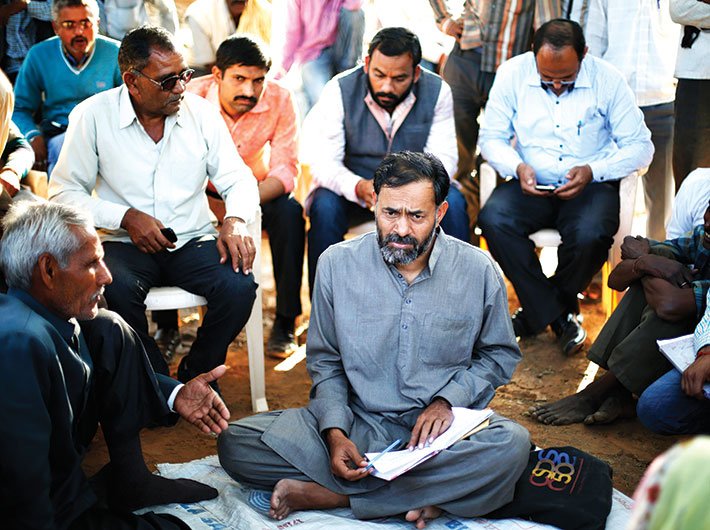It’s a disturbing sociopolitical vacuum that he is trying to fill – a void that has been created after the demise of farmer leaders like Charan Singh and Mahendra Singh Tikait. For Yogendra Yadav, former Aam Aadmi Party member, this is the moment in history when farmers need to be organised more than ever. In an interaction with Shubhendu Parth he talked about the severity of the drought in many parts of the country, especially in Bundelkhand, and why he is not ashamed of taking the farmer politics route to electoral politics.
The supreme court decision to seek response from the central and state governments on how they are dealing with drought shows the criticality of the issue. How bad is the situation?
It is shocking to see the contrast between how bad the drought situation is and how little it is known. In terms of sheer statistics, we know that this is the second consecutive drought nationally. Last year we suffered 12 percent deficit rainfall across the country, this year the deficit is 14 percent. And what is still not appreciated adequately is that post-monsoon rain has been worse. Even after taking into account the excessive rainfall in Tamil Nadu and Andhra Pradesh, the overall post-monsoon deficit in the country is 23 percent. For most parts of north and east India, the deficit is in the range of 40-60 percent, which is having a debilitating consequence for the Rabi crop. So we are looking at the fourth consecutive crop damage, and in some cases fourth consecutive crop failure. That is what makes the situation so bad.
Read more: Why Bundelkhand is on the verge of the worst-ever famine
In fact, the impact of these consecutive failures is for anyone to see. There is a drinking water shortage ranging from severe to emergency. There are many places in Marathwada and Bundelkhand where we are looking at ‘water emergency’. In other parts it is not a drinking water problem but it is still a serious problem for irrigation. But the real epicentre of the entire drought in the country is Bundelkhand. And if you were to ask me to point out even further, I would say the districts of Mahoba, Hamirpur, Tikamgarh and Chhattarpur are the worst hit.
Is Bundelkhand facing a famine?
While it would be harsh and hasty to conclude that famine has arrived, we need to recognise that we are closer to it as far as water is concerned. We have moved a couple of steps closer to famine in terms of availability of food and nutrition for humans. However, for the animals, in large parts of the country, famine has indeed arrived.
The fodder stocks have been exhausted, and because of the widespread nature of the drought, fodder is not available in nearby areas. There is also a drinking water problem for the cattle. Millions of cows are just being let off in the stretch starting from Bundelkhand and up to Rajasthan. These animals are on the verge of hunger and are destroying whatever is remaining of the existing crop.
What is scarcer – water or food?
There are two or three major concerns. Beside the water scarcity – of both drinking water and irrigation – there is a severe dal crisis. The dal crops failed so it did not reach the farmers’ home. The prices went up so they cannot buy it. It is important to note that this is the only source of protein for a large section of the Indian population. No one seems to be thinking about it. When we travelled in Bundelkhand, I asked this question to every woman I met and not a single woman said she cooked dal every day.
Your PIL has sought court intervention for implementation of the National Food Security Act (NFSA) in drought-affected areas. Does that mean failure of NFSA so far?
Formal acceptance of NFSA is not what matters. What matters is whether food grains have reached the people. The fact is that it has not, except in some cases. I was told that Madhya Pradesh and Bihar have done comparatively a little better on this front. But in most states, despite the new NFSA coming into being, the old APL (above poverty line)-BPL (below poverty line) distinction persists. Also a substantial chunk of poor people in every village who have no ration card – old, new, white or yellow – and they are completely excluded from the existing system. They have no access to ration. Almost no governments in the drought affected areas have provisions for dal – something that we have requested the court to order. I would say that other than claiming that they have the new NFSA, no government has introduced any new measures to provide food to the people even after discovering that there is drought.
From raising the drought issue in rural India to a tractor rally and the Samvedna Yatra in villages, as well as the Jai Kisan Andolan – are you taking the farmer politics route to electoral politics?
Without any hesitation and shame I would say that this is what we want to do. Farmers’ survival is one of the biggest issues facing the country today. If there is one moment in the history when farmers need to be organised, this is the moment. There was a time when we had a strong farmer voice that the government could not ignore. Today there is a void. So some people need to come together to fill it. If Jai Kisan Andolan and Swaraj Abhiyan can do anything in that direction we would like to take it forward. This is the need of the hour; call it by any name – farmer politics or farmer movement.
What are the key farmer issues that you are taking up?
The most critical issue for a farmer is assured income. Price of farm output has not gone up, but price of everything else has gone up. So farming has become an unviable profession. If the government can set up the seventh pay commission for its employees why can’t it set up a farmers commission with statutory powers to monitor and safeguard farmers’ income? We are also pushing for crop loss damage and crop loss insurance. Next, there is a need to create adequate irrigation facilities because majority of agriculture in India is still rain-fed. Then there is the issue of land holdings, especially for the dalits who are deprived of land for agriculture which can happen only through land reforms. This calls for redistribution of land to poor agricultural households from ceiling surplus and other lands. There is a need to restrict ownership by absentee landlords and non-agriculturists to ensure that lands should not remain fallow.
There is also the need to provide sources of employment in rural areas beyond agriculture. In our country, rural areas were not merely about agriculture. This is one fallacy. Today we have reduced rural to just agriculture. Instead we need to supplement agriculture. Rural areas need industries but not the modern factories. Service, handicraft work, small industries are also needed for rural areas. If you denude rural areas of all employment opportunities how do you expect human beings to live there?
Is it farmer politics that made you test waters by contesting the Punjab by-election?
We are yet to get into electoral politics but have decided to support Bhai Baldeep Singh for the Khadoor Sahib assembly by-election. He is not our candidate but contesting independently. Bhai Baldeep Singh is a unanimous choice of many organisations and Swaraj Abhiyan has also decided to extend its support to him since he has devoted himself fully to the sociopolitical revival in Punjab.

